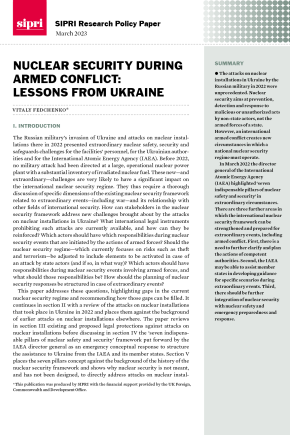Nuclear Security During Armed Conflict: Lessons From Ukraine
The attacks on nuclear installations in Ukraine by the Russian military in 2022 were unprecedented. Nuclear security aims at prevention, detection and response to malicious or unauthorized acts by non-state actors, not the armed forces of a state. However, an international armed conflict creates new circumstances in which a national nuclear security regime must operate.
In March 2022 the director general of the International Atomic Energy Agency (IAEA) highlighted ‘seven indispensable pillars of nuclear safety and security’ in extraordinary circumstances. There are three further areas in which the international nuclear security framework can be strengthened and prepared for extraordinary events, including armed conflict. First, there is a need to further clarify and plan the actions of competent authorities. Second, the IAEA may be able to assist member states in developing guidance for specific scenarios during extraordinary events. Third, there should be further integration of nuclear security with nuclear safety and emergency preparedness and response.
I. Introduction
II. Military attacks on nuclear installations in Ukraine and before
III. Existing and proposed legal protections against attacks on nuclear installations
IV. Nuclear security and nuclear safety in extraordinary circumstances: The IAEA director general’s seven pillars
V. Nuclear security before the events of 2022: Three milestones
VI. National nuclear security regimes and allocation of responsibilities to address threats
VII. Planning nuclear security response to extraordinary events
VIII. Conclusions and recommendations

